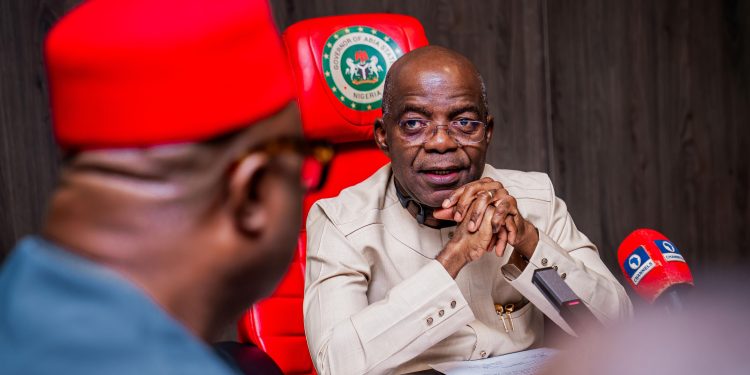In a move that could redefine the relationship between government and citizens, Abia State’s Governor, Dr. Alex Otti, OFR, is calling for a powerful, collective effort to protect the state’s burgeoning infrastructure. This is not just a call for vigilance, but a strategic partnership with the very people benefiting most from the transformation: Aba’s business community. The governor’s appeal, made during a meeting with key business groups, signals a new chapter in the state’s development—one where citizens are not just recipients of progress but its active guardians.
On Tuesday, August 19, Governor Otti hosted the executives of the Association of International Traders (AIT) and the Ultimate Importers Associations (UIA). Led by their presidents, Prince Edmund Igwe and Chief Iroegbu U. Agu, the delegations came to his office with a singular purpose: to express their gratitude. They spoke of a city revitalized, where decades of decay and neglect are being systematically reversed. The restoration of infrastructure and the cleaning of the environment, they noted, have led to a massive boom in their businesses, making it safer and more profitable to operate. The days of containers toppling over on dilapidated roads and warehouses being freely looted, they said, are a distant memory.
ALSO READ: https://nationscuriosity.com/galadima-reveals-why-kwankwaso-may-not-back-t/
Governor Otti acknowledged their appreciation, stating that providing a conducive environment for hardworking people is a fundamental duty of the government. He expressed satisfaction with the progress made in the two years and a few months since his administration began its mission to “recover Aba.” However, he stressed that the work is far from over and that the government cannot do it alone.
“The job is not an entirely easy one. But, we are not worried because we have people like you who would come back to show appreciation,” Governor Otti remarked.
The core of his message was a powerful appeal to the business leaders to become partners in progress. He requested their support in two critical areas: protecting public infrastructure from vandalism and theft, and helping to sustain the newfound cleanliness of the city. He cited a recent, grim incident on Omuma Road where a vandal was electrocuted while attempting to steal power cables. The governor expressed his dismay, emphasizing that such acts must not be heard of in a state striving for progress.
“We also have a few requests to make. One of them is that all the infrastructures we are putting in place… they are all for all of you. So, we request that you protect them,” he urged.
Governor Otti underscored the importance of a widespread campaign to keep the environment clean, transforming it into a “new mantra” for every resident. He warned that the infamous refuse dumps could reappear if stakeholders become complacent. He urged citizens to take an active role in enforcing the new environmental standards, calling on them to correct anyone they see improperly disposing of waste.
The governor also highlighted the ongoing rehabilitation of inner-city roads, spearheaded by the Greater Aba Development Agency (GADA). He praised the business community for their timely payment of taxes, a sign of their trust and appreciation for the government’s efforts.
“I have always insisted that if you do the right thing, people will appreciate what you have done. Anytime that the Government has to deploy Agberos or extrajudicial measures to get people to pay taxes, that means that the Government is not doing what it is supposed to do,” he added, differentiating his administration’s approach.
The PRO of the Associations, Chief James Agbagha Ochunkwo, offered a vote of thanks, commending the governor’s unprecedented infrastructural interventions and affirming that businesses are flocking back to the state. The meeting, which included key government officials like the Commissioner for Transport, Dr. Chimezie Ukaegbu, and the Commissioner for Trade and Commerce, Mr. Chibueze Nwokocha, served as a powerful testament to the new spirit of collaboration in Abia State. The question now remains: will this bold call to action be embraced by the populace, cementing a new model of shared responsibility and sustained progress?


